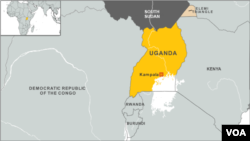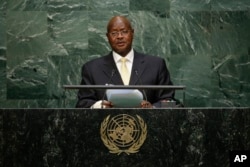The Inter-Religious Council of Uganda (IRCU) plans to hold a presidential debate on January 15, ahead of next year’s presidential, legislative and local elections.
It would be the first presidential debate with all eight participating candidates. It is the only debate scheduled and is expected to last three hours.
IRCU officials said they will consider organizing another debate by popular demand or if the presidential candidates themselves ask for it.
Incumbent President Yoweri Museveni of the ruling National Resistance Movement (NRM) will face off with seven opposition candidates, including his onetime allies, former prime minister Patrick Amama Mbabazi, and independent candidate and main opposition leader Kizza Besigye of the Forum for Democratic Change (FDEC).
Joshua Kitakule, the IRCU secretary general, said Ugandan voters will have the opportunity to watch, listen and weigh the policies of all the candidates.
Uganda’s most popular television station, NTV, will broadcast the debate and make it available to all other television and radio stations across the country. The debate would also be distributed on social media platforms including Facebook and Twitter, according to Kitakule.
Opposition leader
His comments came after President Museveni agreed to participate, following demands for a debate by main opposition leader Besigye.
"We have been working with the managers of the eight presidential candidates, and we want to make sure that all the presidential candidates show up for the debate. We have written to them and some of them have committed themselves, including the president himself," Kitakule said.
"Ugandans are really anxious about this debate because we think that through this process the candidates would be able to explain their manifesto to the country but also to the international community. They would also be able to ask each other questions and then it would give them an opportunity to clarify some of the issues [among] themselves that they have been talking about. So we are really hoping that this will be successful," he said.
Opposition supporters have expressed skepticism about President Museveni’s promise to be part of the debate. They said he can’t be trusted, after accusing him of repeatedly reneging on promises of stepping down after years as the country’s leader, but rather amended the constitution to remove term limits. They also said the president has refused to participate in debates despite repeated calls for him to do so.
Kitakule disagreed. "Of course he has always been committed, only that the public did not know. Because the Inter-Religious Council of Uganda had earlier on spoken to him and he had said yes he would be willing to appear for the debate," he said.
"What the people of Uganda should expect from the debate is that they would now have the opportunity to listen at the same time to the different candidates and what the presidential candidates would want to do for this country," he said.
The candidates are currently campaigning for the general election.












